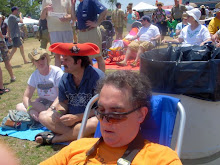Medical Marijuana: Is Jury Nullification the Next Step?
Since the June 6th Supreme Court decision in Gonzalez v. Raich, medical marijuana supporters have largely determined to focus on lobbying congress. While Raich did not overturn state medical marijuana laws in the eleven states that have them (Alaska, California, Colorado, Hawaii, Maine, Maryland, Montana, Nevada, Oregon, Vermont and Washington), it did permit the federal government to arrest medical marijuana patients in those states. (State medical marijuana bills exempt qualified patients who use cannabis medicinally from state criminal penalties.)
Congress is expected to vote later this month on a bipartisan amendment sponsored by Reps. Dana Rohrabacher (R-CA) and Maurice Hinchey (D-NY) that would prohibit the federal government from spending taxpayers' dollars to prosecute patients who comply with their state's medical marijuana laws. Yet Congress has refused to pass a similar bill before, and has by all appearances only moved further towards intolerance in the interim. It seems a stretch to believe that this Congress will act to protect medical marijuana patients.
In some areas, particularly the San Francisco/Oakland area of Northern California, it seems likely that jury nullification may be an increasing threat in federal marijuana cases. In 2003, jurors revolted after convicting Ed Rosenthal of growing 100 pounds or more of marijuana in a highly disputed San Francisco federal case. The jury was outraged that they had not been informed that Rosenthal was growing the marijuana for distribution to medical dispensaries. Juror Marney Craig, a 58 year old Marin County property manager, labeled the trial "a cruel charade." "It is the most horrible mistake I have ever made," she said. "I feel like we were sheep, we were manipulated."
The foreman, Charles Sackett, said, "I fail to understand how evidence and testimony that is pertinent, imperative and representative to state government policy, as well as doctor and patient rights, and indeed your own family, are irrelevant to this case."
Following Rosenthal's conviction, five of the jurors joined Rosenthal on the steps of the Federal Courthouse, denouncing their own verdict, saying they had been manipulated and misdirected, and demanding that Rosenthal receive a new trial. Not surprisingly, the trial court judge, Charles Breyer (brother of U.S. Supreme Court Justice Steven Breyer) refused to consider the jurors protests or grant a new trial. However, in the glare of negative publicity, Judge Breyer eventually gave Rosenthal - whom the federal government wanted to send to prison for six and a half years - a startling one-day sentence.
JURY NULLIFICATION FOLLOWING ROSENTHAL
The Rosenthal jurors convicted without being aware of their nullification prerogative. However, the Rosenthal case made the issue of jury nullification a front page item - and cast it in a positive light. Articles on the jury revolt, often including statements by Sackett and others that jury nullification would play a large rule in future trials, were carried by the New York Times, Newsday, the Washington Post, Reuters, the San Francisco Chronicle, San Francisco Examiner, Oakland Tribune, the Chicago Tribune, the Associated Press and elsewhere. The jurors themselves appeared on numerous nationally televised news broadcasts.
Will medical marijuana advocates, such as Americans for Safe Access, NORML and Green-Aid, find that educating the jury pool in their nullification prerogative is their only way to defeat the Federal efforts to steam-roller their home-grown velvet revolution? It wouldn't be an unreasonable choice. Particularly in Northern California, it would be difficult to imagine putting together a jury of 12 people without including at least one medical marijuana supporter. Such a person could simply refuse to convict - claiming to find the evidence unconvincing - and avoid a conviction. Any acquittals and/or hung juries would successfully announce to other potential jurors that they simply did not have to convict. In short, a few recalcitrant "stealth" jurors could cut government prosecution efforts off at the knees.
Moreover, should jurors decide not to convict in cases of this sort, Congress might be spurred on to finally pass a law exempting state-authorized medical marijuana patients from prosecution. The acquittal of John Peter Zenger paved the way for the reform of English libel law, and as the acquittals of abused women in "burning bed" cases paved the way for battered woman syndrome defenses, have shown that jury nullification can foreshadow dramatic changes in the law.
Independent jurors could force a change in the way our drug laws treat seriously ill people who smoke marijuana to relieve suffering and prolong their lives. And I don't think you have to be stoned to think that such a change is long overdue.


1 Comments:
Hey
Every one linke good health so come and know about better health
medical marijuana doctor
Post a Comment
<< Home